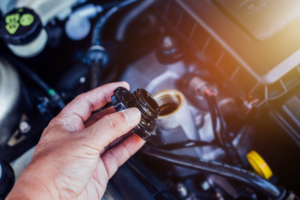 Introduction to Brake Oil Leaking Repair
Introduction to Brake Oil Leaking Repair
Brake oil leakage is a critical issue that can significantly affect the safety and performance of your vehicle. It’s one of those problems that, if left unchecked, could lead to disastrous consequences on the road. In this detailed guide, we will explore everything you need to know about brake oil leaking repair, the causes, signs, solutions, and why timely intervention is essential.
Understanding Brake Oil and Its Importance
Brake oil, commonly known as brake fluid, is an essential component in your vehicle’s braking system. It transmits the force from the brake pedal to the brake pads, enabling your car to stop when needed. This fluid must be maintained at optimal levels to ensure smooth braking. However, like all fluids, brake oil can leak, leading to reduced braking efficiency and, ultimately, brake failure.
What Causes Brake Oil Leaks?
Before diving into brake oil leaking repair, it’s crucial to understand the various causes behind this issue:
- Damaged Brake Lines: The brake lines carry the fluid from the master cylinder to the brakes. Any damage, corrosion, or wear and tear in these lines can result in leakage. Brake lines are often exposed to harsh environmental conditions, which can contribute to their deterioration over time.
- Faulty Brake Calipers: The brake calipers house the brake pads and are essential for applying pressure on the brake disc. If the caliper seals wear out or become damaged, brake oil can leak from this area.
- Worn-Out Master Cylinder: The master cylinder is the heart of the braking system. It holds the brake fluid and converts the force from your foot on the brake pedal into hydraulic pressure. A worn-out or cracked master cylinder can result in a significant brake oil leak.
- Loose Bleeder Screws: During brake servicing, bleeder screws are used to remove air from the braking system. If these screws are not tightened correctly or become loose over time, brake fluid can leak.
- Old Brake Hoses: Over time, brake hoses, which are responsible for transmitting brake fluid under high pressure, can deteriorate or crack. Old, worn-out hoses are one of the leading causes of brake oil leakage.
Signs That Your Brake Oil Is Leaking
Detecting a brake oil leak early can save you from major repairs and safety hazards. Some of the most common signs include:
- Soft Brake Pedal: A spongy or soft brake pedal is one of the most common indicators of a brake fluid leak. If you have to press the pedal harder than usual to stop the vehicle, it’s time to inspect the brake fluid levels.
- Brake Warning Light: Many modern vehicles come equipped with sensors that alert the driver if there is a problem with the braking system, including low brake fluid levels. If this light comes on, don’t ignore it.
- Puddle Under the Car: If you notice a clear or slightly yellowish fluid puddling under your car, it could be brake fluid. This is a clear indication that there is a leak, and immediate repair is necessary.
- Reduced Braking Performance: If you notice that your vehicle takes longer to stop or you have to apply more pressure on the brake pedal, it could be due to a loss of brake fluid.
- Unusual Noises: Squeaking or grinding noises when applying the brakes can also be a sign of brake oil leaking. While these sounds are often associated with worn-out brake pads, a fluid leak can exacerbate the issue.
Steps for Brake Oil Leaking Repair
Addressing a brake oil leak promptly is crucial for your safety. Depending on the cause, the brake oil leaking repair process can vary. Below are the steps involved in repairing a brake oil leak:
1. Inspect the Brake System
The first step in brake oil leaking repair is a thorough inspection of the entire braking system. Look for visible signs of leakage around the brake lines, calipers, master cylinder, and hoses. Identifying the source of the leak is essential for determining the appropriate repair.
2. Replace Damaged Brake Lines or Hoses
If the brake lines or hoses are damaged, they must be replaced. This involves removing the old, worn-out parts and installing new ones. It’s essential to use high-quality brake lines or hoses to ensure the longevity of the repair.
3. Repair or Replace Brake Calipers
If the brake oil is leaking from the calipers, the caliper seals may need replacement. In some cases, the entire caliper may need to be replaced if it’s too worn or damaged. The caliper repair process involves removing the old seals, cleaning the caliper components, and installing new seals.
4. Master Cylinder Repair
A leaking master cylinder may require a full replacement. In some cases, the seals can be replaced, but if the cylinder is significantly damaged or corroded, it’s best to install a new one. This is a complex repair that should be handled by an experienced mechanic.
5. Tighten Bleeder Screws
If the bleeder screws are the cause of the brake oil leak, simply tightening them may solve the problem. In some cases, the screws may need replacement if they are stripped or damaged.
6. Bleed the Brakes
Once the repair is complete, it’s crucial to bleed the brakes to remove any air from the system. Air in the brake lines can lead to a spongy brake pedal and reduced braking performance. Bleeding the brakes ensures that the brake fluid is free of air and operates at maximum efficiency.
7. Refill Brake Fluid
After repairing the leak and bleeding the brakes, refill the master cylinder with the appropriate brake fluid. It’s important to use the right type of brake fluid for your vehicle, as using the wrong type can lead to further issues.
Why Timely Brake Oil Leaking Repair Is Essential
Driving with a brake oil leak can be extremely dangerous. Brake fluid is crucial for the braking system to function properly. Without it, the brakes won’t have the necessary hydraulic pressure to stop your vehicle effectively. Timely brake oil leaking repair ensures:
- Optimal Braking Performance: A well-maintained braking system ensures that your car can stop quickly and efficiently when needed.
- Safety on the Road: Brake failure can lead to accidents, putting you and others at risk. Repairing a brake oil leak can prevent such dangerous situations.
- Cost Savings: Addressing a brake fluid leak early can save you from more expensive repairs down the line, such as replacing the entire braking system.
Brake oil leaking repair is a critical task that should never be delayed. Whether it’s a minor leak from a loose bleeder screw or a major issue with the brake lines or master cylinder, addressing the problem quickly ensures your vehicle’s safety and performance. Regular brake system inspections, proper maintenance, and prompt repairs can help you avoid the dangers of brake fluid leaks, keeping you safe on the road.
If you notice any signs of a brake oil leak, take your car to a qualified mechanic immediately. Don’t compromise your safety; ensure your brakes are always in top condition.
Looking for the best car service shop near Dubai? Check out https://autostadtmotorservices.ae/They offer top-notch services, including:
Here are some more information for your convenience:
Visit their blog AutoStadt Motor Services! for the latest updates and service tips!

